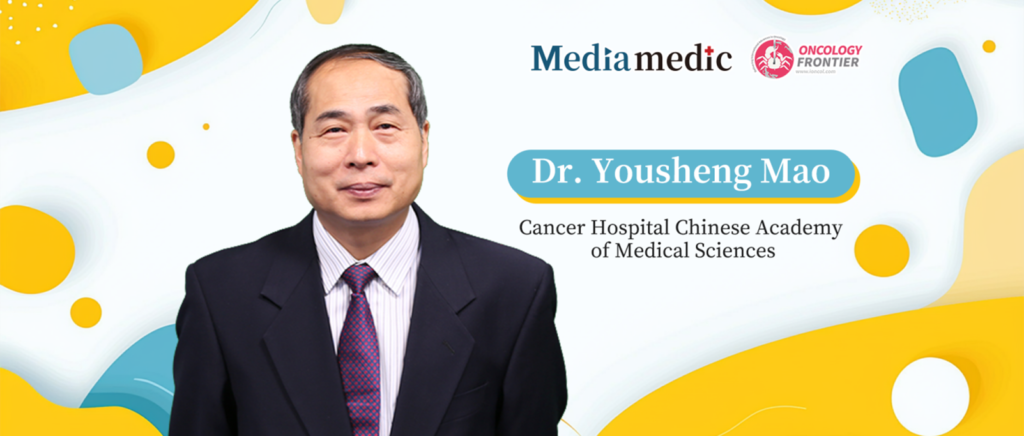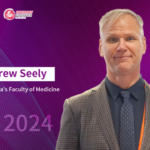
Editor’s Note: From September 26 to 28, 2024, the "2024 China Anti-Cancer Association Integrated Esophageal Cancer Academic Conference" was held grandly in Hefei, hosted by the China Anti-Cancer Association (CACA) and the CACA Integrated Esophageal Cancer Committee, with five subcommittees on esophageal cancer joining forces with Anhui Medical University's First Affiliated Hospital. Alongside, the "16th China Anti-Cancer Association Esophageal Cancer Conference" also took place.At this prestigious event, Oncology Frontier had the opportunity to interview Dr. Yousheng Mao from the Cancer Hospital Chinese Academy of Medical Sciences. Professor Mao introduced the conference’s highlights and outlined the future focus and plans for the newly established Integrated Esophageal Cancer Committee. He also provided an insightful review of the evolution of esophageal cancer surgery in China, discussing regional differences in diagnosis and treatment across the country.
Oncology Frontier: How would you evaluate the current trend in minimally invasive surgery for esophageal cancer, and what are the significant advantages compared to traditional open surgery?
Dr. Yousheng Mao: After more than ten years of progress in minimally invasive techniques, these surgeries have now become the mainstream choice for treating esophageal cancer, including combined thoracoabdominal procedures and robotic surgeries. In many major medical centers, over 90% of esophagectomies are performed using minimally invasive techniques. Compared to traditional open surgery, these procedures offer several advantages: first, less trauma to the patient; second, more thorough lymph node dissection; and third, significantly improved patient survival outcomes. These improvements are likely due to both the thorough lymph node dissection during surgery and the better preservation of organ and immune function in patients. Currently, robotic surgery and combined thoracoabdominal approaches are the leading technologies in this field.
Oncology Frontier: Could you summarize the revision principles and highlights of the latest CACA guidelines on esophageal cancer treatment?
Dr. Yousheng Mao: The second edition of the CACA esophageal cancer treatment guidelines, under the guidance of Academician Jie He, underwent a comprehensive overhaul. Compared to the first edition, the second edition adopts a more modern presentation style, emphasizing an international perspective, streamlined process-based guidance, and clear, concise expression. The key highlights of this edition are its refined content and its strong alignment with international treatment standards, enhancing its practicality for both domestic and international professionals.
In terms of content updates, the second edition incorporates the latest research findings and has undergone a thorough update of its references. To improve the accuracy of clinical guidance, each treatment recommendation in the guidelines is clearly marked with its level of evidence and strength of recommendation, ensuring transparency and scientific rigor. These improvements align with current medical practice needs and provide authoritative, practical references for esophageal cancer clinical treatment.
Oncology Frontier: As the chair of this year’s conference, what do you consider the standout highlights of this event? How will the successful hosting of this conference impact the progress of the esophageal cancer field, and how will it shape future research and clinical practice?
Dr. Yousheng Mao: Under the careful guidance and support of Academician Daiming Fan, this year’s conference marked the official establishment of the CACA Integrated Esophageal Cancer Committee. This committee brings together experts from various professional fields, including surgery, rehabilitation, integrated traditional Chinese and Western medicine, screening, and nursing, with the aim of creating a multidisciplinary collaborative platform. Through this innovative initiative, we hope to integrate expertise from different fields and validated clinical treatment strategies.
The core mission of the committee is to optimize resource allocation and promote best practices in esophageal cancer treatment, providing comprehensive and cohesive medical services to patients. By integrating cutting-edge medical research, extensive clinical experience, and holistic patient care knowledge, we aim to build an all-encompassing treatment model. This model will not only enhance treatment outcomes but also improve the overall quality of life for patients.
Additionally, the committee will actively promote collaboration among peers, sharing data, experiences, and technologies to accelerate progress in the esophageal cancer treatment field. We believe that interdisciplinary collaboration will provide patients with more personalized and precise treatment plans, ultimately achieving the goal of improving survival rates and quality of life.
Oncology Frontier: As the newly appointed executive director of the CACA Integrated Esophageal Cancer Committee, could you outline the committee’s upcoming priorities and plans?
Dr. Yousheng Mao: Under the leadership of Chairman Daiming Fan, the establishment of the CACA Integrated Esophageal Cancer Committee marks a new milestone in esophageal cancer treatment. The committee’s primary goal is to foster interdisciplinary collaboration, integrating various resources to conduct clinical and basic research, as well as research combining clinical and technological advancements, to discover more effective treatments and evidence for esophageal cancer.
Moving forward, we will focus on several key areas:
First, we will update the treatment guidelines to ensure alignment with the latest scientific research.
Second, we will promote multidisciplinary collaboration, fostering exchanges and cooperation among different specialties to enhance overall treatment levels.
Lastly, through systematic data collection and analysis, we will evaluate the effectiveness of existing treatment protocols and provide scientific support for future research and treatment strategies.
Oncology Frontier: We noticed that you recently co-authored a paper titled Current Status and 30-Year Changes in Esophageal Cancer Surgery in China, which reviewed the evolution of esophageal cancer surgery and examined regional differences in treatment across the country. Could you provide an overview of the current state of surgical treatment for esophageal cancer in China and the regional disparities that exist?
Dr. Yousheng Mao: Before 2010, there were significant disparities in esophageal cancer treatment across different regions in China. Coastal and technologically advanced areas had higher levels of treatment, while some economically and technologically underdeveloped regions lagged behind. This disparity led to inconsistent practices in surgical approaches, choice of surgical procedures, lymph node dissection, and comprehensive treatment strategies.
Since 2010, under the leadership of Academician Jie He, the esophageal cancer professional committee has actively conducted nationwide tours to promote standardized treatment procedures and advanced treatment concepts. Through efforts from experts like Professors Jianhua Fu, Tao Ren, and many others, minimally invasive surgery has been widely adopted through live surgical demonstrations. This has not only improved treatment levels nationwide but also significantly enhanced the uniformity of treatments across regions.
With the widespread adoption of minimally invasive techniques, the level of diagnosis and treatment for esophageal cancer has greatly improved. The most notable achievement has been the increase in the five-year survival rate, from 30% in the past to 60% today, reflecting a remarkable improvement in treatment uniformity.
Dr. Yousheng Mao
• Doctor of Medicine, Chief Physician, Doctoral Supervisor
• Director of the Thoracic Surgery Ward, Cancer Hospital Chinese Academy of Medical Sciences
• Chair, CACA Esophageal Cancer Professional Committee
• Former Chair, Chinese Society for Diseases of the Esophagus
• Member, International Society for Diseases of the Esophagus, Union for International Cancer Control, International Association for the Study of Lung Cancer
• Editorial board member of the Chinese Journal of Oncology, Chinese Journal of Surgery, and reviewer for various journals
• Specializing in thoracoscopic minimally invasive surgery for lung cancer, esophageal cancer, and mediastinal tumors, as well as early lung cancer imaging diagnosis and analysis
• Extensive experience in clinical research on lung and esophageal cancer, including involvement in national key projects


